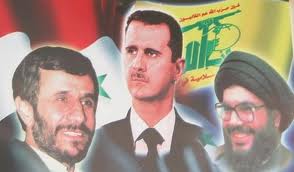 BEIRUT, Lebanon- Hezbollah’s reported deployment of “military advisers” in Syria to aid its beleaguered ally, President Bashar Assad, suggests his regime’s war against rebels isn’t going well and that Iran, Hezbollah’s patron, is worried it could lose Syria, its key Arab ally.
BEIRUT, Lebanon- Hezbollah’s reported deployment of “military advisers” in Syria to aid its beleaguered ally, President Bashar Assad, suggests his regime’s war against rebels isn’t going well and that Iran, Hezbollah’s patron, is worried it could lose Syria, its key Arab ally.
As things seem to stand in Syria, with rebel forces armed by Saudi Arabia and Qatar and aided by U.S. and French intelligence becoming more aggressive by the day, there’s a sense across the region the Assad regime’s days are probably numbered.
“Iran is facing a geopolitical setback in Syria,” observed the U.S. global intelligence consultancy Stratfor in a Sept. 19 analysis.
“It could be a while before the Alawite regime collapses … but critical pillars of the regime are weakening.”
The report that Hezbollah is sending “military advisers” to help Assad underlines what has long been suspected: that Hezbollah, the most powerful non-state force in the Middle East with decades of fighting Israel, is already in Syria in some strength.
It’s unlikely in the extreme that Hezbollah, created by the Islamic Revolutionary Guards Corps in 1982 and funded and armed by them since, would have made such a move with Tehran’s approval because of the geopolitical implications.
In Syria, the Shiite movement’s seasoned guerrillas, who these days resemble a conventional army, are fighting alongside units of the IRGC.
In particular, Hezbollah, which operates on behalf of Iranian intelligence, is working with Iran’s elite Al-Quds Force, the guards’ covert arm that has long deployed in Lebanon and oversees Hezbollah’s military operations.
These highly experienced and disciplined forces are a formidable enemy for Syria’s rebels, still plagued by internal rifts, but it remains to be seen whether they’ll tip the scales in the Assad’s regime’s favor, or trigger intervention.
The scale of Iranian involvement isn’t known. Washington has accused Hezbollah of providing aid for Assad. Hezbollah denies that.
But there have been persistent reports in Lebanon for weeks that Hezbollah fighters killed in Syria are being quietly buried in their home villages without the high-profile public funerals accorded comrades slain fighting Israel.
Hezbollah, led by the charismatic and politically astute Hassan Nasrallah, has a vested interest in ensuring Assad stays in power.
Syria is Iran’s strategic supply corridor to Hezbollah, the gateway that will allow an Iranian arc of power from the Zagros Mountains to the Levant.
The prospect of the Damascus regime falling has caused considerable uncertainty within Hezbollah’s leadership. At the very least, it will cut off Hezbollah from Iran, and thus reduce its power inside Lebanon.
“Hezbollah’s political survival is likely even in the event of Assad’s fall,” observed Oxford Analytica, “with a weakened Hassan Nasrallah possibly more susceptible to Iranian influence.”
The reported deployment of Hezbollah “military advisers” follows a string of unusual and increasingly categorical admissions by senior Iranian officers in recent weeks that Iranian forces are in Syria, over and above the normal IRGC contingent based near the Lebanese border.
This marked a significant shift in Iran’s policy of ambiguity when it came to its involvement in Syria.
“Tehran wants to salvage as much of the Alawite power as it can,” Stratfor noted.
“It has tools at its disposal, including the threat of a post-transition Alawite-led insurgency similar to the post-Saddam Hussein insurgency in neighboring Iraq.
“None of Syria’s neighbors, the regional players or the foreign powers with an interest in Syria — including the United States — wants to see an insurgency develop,” Stratfor said.
Ali Alfoneh, an Iran expert with the American Enterprise Institute in Washington, says the Revolutionary Guards’ admissions of involvement in Syria highlight divisions within the Tehran leadership about the crisis.
“The organization has an interest in making its presence known in order to increase its leverage over other branches of the Iranian government,” he observed.
“The admissions … are a way of communicating that those who desire a negotiated settlement to the crisis in Syria must involve the Al-Quds Force,” he noted.
“The statements … can also be interpreted as the IRGC’s way of threatening to increase its intervention, which would transform civil war in Syria into a regional war.
“The threat obviously aims for force Westerners, Turks and Saudis to think twice before getting further embroiled in a proxy war.”
upi.com

Leave a Reply
You must be logged in to post a comment.